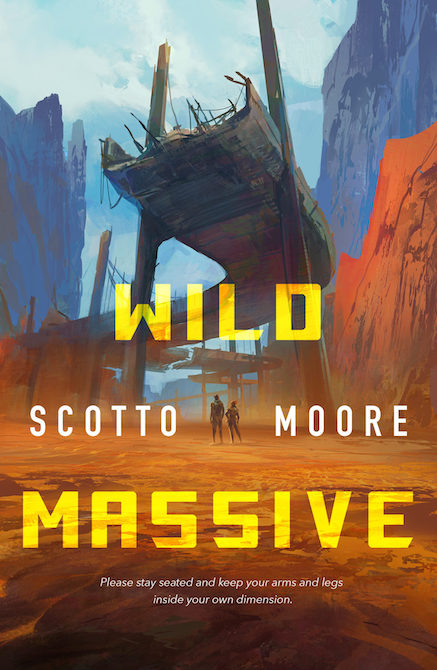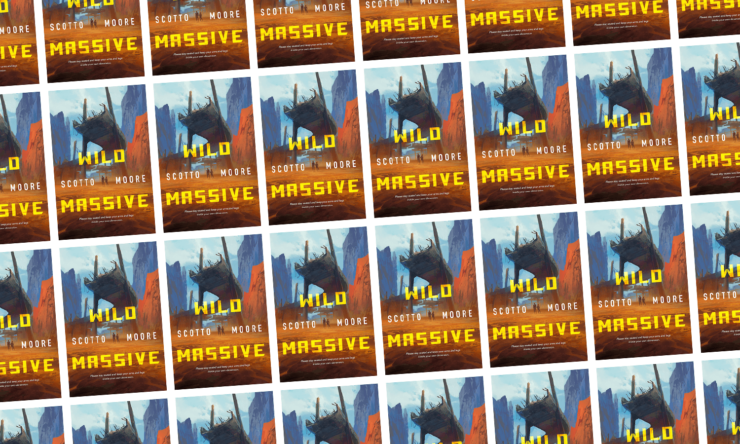A good half of Scotto Moore’s Wild Massive is set in technomagical amusement parks, which aptly supply all the metaphors that spring to mind for describing this novel. Moore’s sophomore novel is not just a roller coaster, it’s a roller coaster that becomes a tilt-a-whirl that becomes bumper cars that become a haunted house that becomes a drop tower. This parallel is no accident. Wild Massive is a self-referential book fascinated by meta-narrative—of course its structure mimics its internal landscape.
As a peak example of chaotic speculative fiction, the book is not one that lends itself well to summary, though the early half does have three main identifiable strands. The first centers on Carissa, who lives in one of the Elevators that whizz up and down the Building, a surreal structure with tens of thousands of floors each with their only reality. The Building is the world of the novel, and the bottom 50,000 floors of the Building are controlled by the Association, a powerful governing body bringing together a range of populations and interests. Carissa is the lone survivor of the Association’s genocidal massacre of her people, a tribe of humans with psychic powers known as the Brilliant. Carissa teams up with Andasir, a sorcerer from the shapeshifting Shai-Manak people, who are the current thorn in the Association’s authoritarian side. Andasir is trying to secretly get into the Association to stop Rindasy, another Shai-Manak sorcerer and the central character of Wild Massive’s second initial storyline. Rindasy has taken on a disguise impersonating an agent from the Association’s special security team, Dimension Force, and been sent into Association territory carrying a magical weapon that could annihilate a thousand floors of life. Yet ze does not plan on using this weapon lightly; zir mission is to find the source of an alarming new psychic attack deployed against the Shai-Manak by Fleet, the Association’s military.
Buy the Book


Wild Massive
Moore’s third primary character is Tabitha Will, a human employee of the Wild Massive entertainment corporation’s brain trust, who can see glimpses of the future when she writes. Having grown up in Wild Massive Super, one of the vast and lucrative theme parks run by the corporation, Tabitha is outside the jurisdiction of the Association but under the influence of her intimidating boss Allegory Paradox, the last Muse (a kind of metaphysical construction specialist) left from the mythological founding of the Building. Tabitha’s sections are the only ones in first person, and as we realize she is something of a narrator shaping the tale we read through her divinatory writing, Wild Massive’s opening cast swiftly expands. Carissa and Rindasy eventually find themselves allies, but that now-unified storyline encounters a carousel of new characters, who occasionally get scenes in which they are the primary perspective. These include: Lorelei Rivers, an Association lawyer with a conscience; Nicholas Solitude, an explorer with a space-time machine; Roland, the general manager of the first and strangest Wild Massive theme park; and Anjette, an indestructible Dimension Force agent made of a block of pure computronium.
It is a testament to Moore’s specificity and writing that I could keep this dazzling solar system of a cast straight. That said, I didn’t feel emotionally attached to a single one of them. Wild Massive offered me the brand-new experience of desperately wanting to know what happened next not out of investment in the characters, but out of fascination with the careening plot. Moore leans hard on what I’ll call selective insta-loyalty. People who’ve just met band together, yet family members abandon each other and people who’ve known each other for years don’t think twice about compromising each other. We’re given to believe Carissa has a decent sense of self-preservation early on, but over and over she decides to help people in ways that throw her directly into harm’s way. Most baffling is the nominally romantic relationship between Andasir and Rindasy, which is mentioned often but never convincingly depicted.
The funny thing is, once I accepted that narrative momentum was going to far outweigh emotional interiority, I thoroughly enjoyed most of Wild Massive. Dizzyingly plotted and blisteringly creative, Moore’s novel is a delightful escapist adventure. The primary conceit of the Building containing tens of thousands of realities is genius, allowing Moore to gleefully make use of practically every speculative trope in the book. Spaceships with jump drives? Check. AI? Check. Pyrokinesis? Check. A group of agents all with different superpowers? Check. Time travel? Check. A witchy villain in a literal black glass castle? Not kidding—check. What is so impressive about this litany is that it all works. No moment in the book’s helter-skelter exploration of its world broke aesthetic integrity for me.
I do wonder why, in the age of the ubiquitous trilogy, all this richness was crammed into a single volume. In his afterword, Moore states that the material for this novel came from four different creative projects in various mediums. As I’ve said, he integrates them pretty damn well, but I imagine condensing all that inventive material is part of what resulted in minimal character arcs.
Naturally, where that lack of arc is most disappointing is the ending. Without spoiling things, Moore chooses to end the meta-narrative rather than the story. Perhaps the idea is that once the overall plot resolves and the characters are no longer part of a larger history, the recorder of their fates loses sight of them. Perhaps Moore has his eye on a sequel, which the lush world of the Building could certainly accommodate. Either way, I felt unceremoniously cut off from the characters I’d been convinced to follow through nearly five hundred pages. I admired the cleverness of the final chapters, but found no narrative satisfaction in them.
Despite my struggle with aspects of Wild Massive, I admit I’ll be keeping an eye out for Moore’s future work. His is a mind I now trust to take me for a hell of a ride.
Wild Massive is available from Tordotcom Publishing.
Read an excerpt here.
Maura Krause is a writer and Barrymore-nominated theatrical director, currently pursuing their MFA in Writing at California College for the Arts.










